Guinea - GN - GIN - GUI - Africa
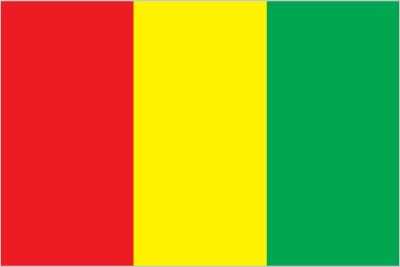
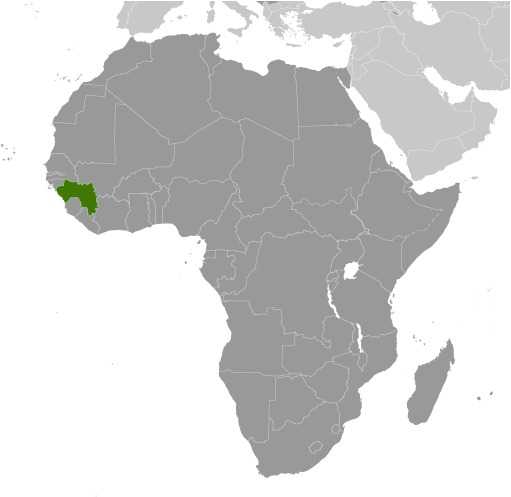
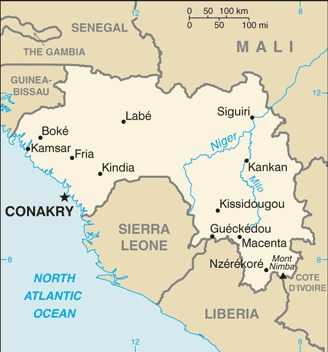
Guinea Images
Guinea Factbook Data
Diplomatic representation from the US
embassy: Transversale No. 2, Centre Administratif de Koloma, Commune de Ratoma, Conakry
mailing address: 2110 Conakry Place, Washington DC 20521-2110
telephone: [224] 65-10-40-00
FAX: [224] 65-10-42-97
email address and website:
ConakryACS@state.gov
https://gn.usembassy.gov/
Age structure
15-64 years: 55.1% (male 3,846,852/female 3,856,366)
65 years and over: 4% (2024 est.) (male 254,608/female 308,413)
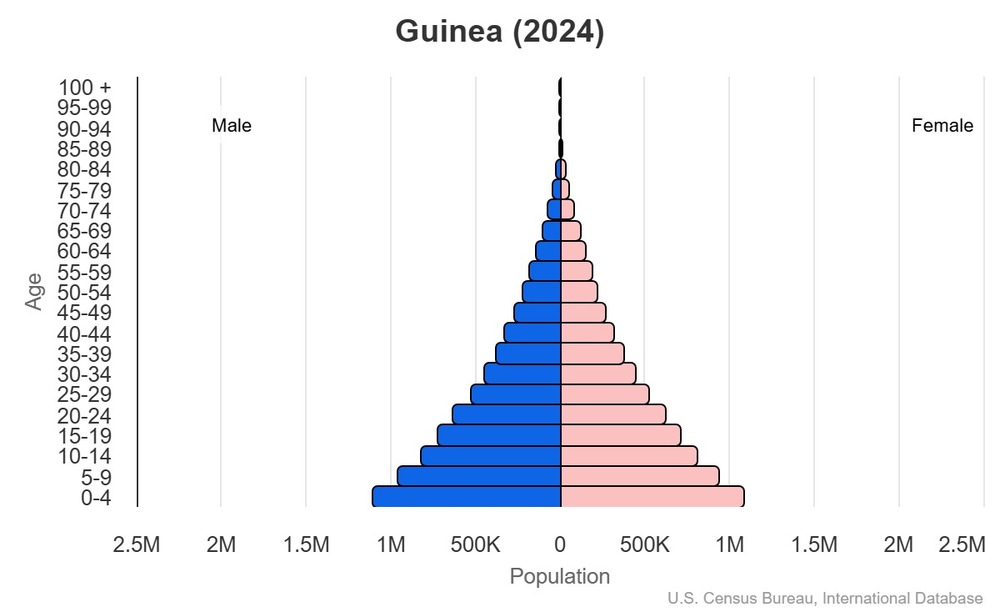
For additional information, please see the entry for Population pyramid on the Definitions and Notes page.
Geographic coordinates
Sex ratio
0-14 years: 1.02 male(s)/female
15-64 years: 1 male(s)/female
65 years and over: 0.83 male(s)/female
total population: 1 male(s)/female (2024 est.)
Natural hazards
Area - comparative
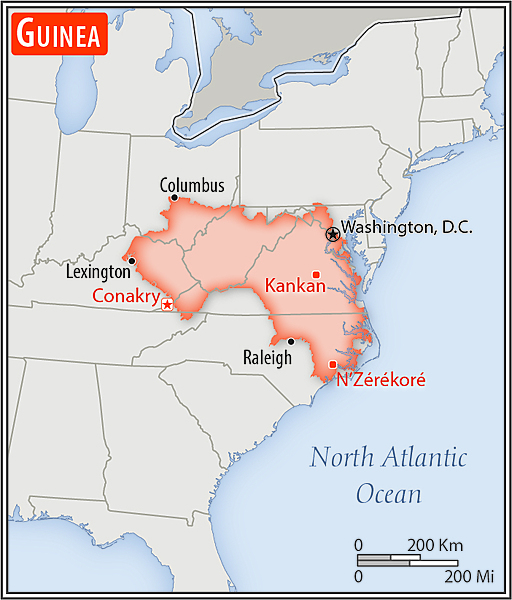
slightly smaller than Oregon; slightly larger than twice the size of Pennsylvania
Background
Guinea's deep Muslim heritage arrived via the neighboring Almoravid Empire in the 11th century. Following Almoravid decline, Guinea existed on the fringe of several African kingdoms, all competing for regional dominance. In the 13th century, the Mali Empire took control of Guinea and encouraged its already growing Muslim faith. After the fall of the West African empires, various smaller kingdoms controlled Guinea. In the 18th century, Fulani Muslims established an Islamic state in central Guinea that provided one of the earliest examples of a written constitution and alternating leadership. European traders first arrived in the 16th century, and the French secured colonial rule in the 19th century.
In 1958, Guinea achieved independence from France. Sekou TOURE became Guinea’s first post-independence president; he established a dictatorial regime and ruled until his death in 1984, after which General Lansana CONTE staged a coup and seized the government. He too established an authoritarian regime and manipulated presidential elections until his death in 2008, when Captain Moussa Dadis CAMARA led a military coup, seized power, and suspended the constitution. In 2009, CAMARA was wounded in an assassination attempt and was exiled to Burkina Faso. In 2010 and 2013 respectively, the country held its first free and fair presidential and legislative elections. Alpha CONDE won the 2010 and 2015 presidential elections, and his first cabinet was the first all-civilian government in Guinean history. CONDE won a third term in 2020 after a constitutional change to term limits. In 2021, Col Mamady DOUMBOUYA led another successful military coup, establishing the National Committee for Reconciliation and Development (CNRD), suspending the constitution, and dissolving the government and the legislature. DOUMBOUYA was sworn in as transition president and appointed Mohamed BEAVOGUI as transition prime minister. The National Transition Council (CNT), which acts as the legislative body for the transition, was formed in 2022 and consists of appointed members representing a broad swath of Guinean society.
Environmental issues
International environmental agreements
signed, but not ratified: none of the selected agreements
Military expenditures
2.1% of GDP (2023 est.)
1.8% of GDP (2022 est.)
1.5% of GDP (2021 est.)
1.4% of GDP (2020 est.)
Population below poverty line
note: % of population with income below national poverty line
Household income or consumption by percentage share
highest 10%: 23.1% (2018 est.)
note: % share of income accruing to lowest and highest 10% of population
Exports - commodities
note: top five export commodities based on value in dollars
Exports - partners
note: top five export partners based on percentage share of exports
Administrative divisions
Agricultural products
note: top ten agricultural products based on tonnage
Budget
expenditures: $2.014 billion (2019 est.)
Capital
geographic coordinates: 9 30 N, 13 42 W
time difference: UTC 0 (5 hours ahead of Washington, DC, during Standard Time)
etymology:
the name derives from konakri, a Susu word meaning "over the water" and referring to the city's location on a peninsula; it was originally the name of a local village
Imports - commodities
note: top five import commodities based on value in dollars
Climate
Coastline
Constitution
Exchange rates
Exchange rates:
9,565.082 (2020 est.)
9,183.876 (2019 est.)
9,011.134 (2018 est.)
9,088.319 (2017 est.)
8,967.927 (2016 est.)
Executive branch
head of government: Prime Minister Amadou Oury BAH (since 27 February 2024)
cabinet: formerly the Council of Ministers appointed by the president
election/appointment process: formerly, the president was directly elected by absolute-majority popular vote in 2 rounds, if needed, for a 5-year term (eligible for a second term), and the prime minister was appointed by the president
most recent election date: 18 October 2020
election results:
2020: Alpha CONDE reelected president in the first round; percent of vote - Alpha CONDE (RPG) 59.5%, Cellou Dalein DIALLO (UFDG) 33.5%, other 7%
2015: Alpha CONDE reelected president in the first round; percent of vote - Alpha CONDE (RPG) 57.8%, Cellou Dalein DIALLO (UFDG) 31.4%, other 10.8%
note 1: in 2021, the military arrested and detained the president, suspended the constitution, and dissolved the government and legislature
note 2: the transitional government has not announced a new election timetable
Flag
meaning: red stands for the people's sacrifice for liberation and work; yellow for the sun, the riches of the earth, and justice; green for the country's vegetation and unity
history: uses the colors of the Pan-African movement
note: the colors from left to right are the reverse of those on the flags of neighboring Mali and Senegal
Independence
Industries
Judicial branch
judge selection and term of office: Supreme Court first president appointed by the national president after consultation with the National Assembly; other members appointed by presidential decree; members serve 9-year terms until age 65
subordinate courts: Court of Appeal or Cour d'Appel; High Court of Justice or Cour d'Assises; Court of Account (Court of Auditors); Courts of First Instance (Tribunal de Première Instance); labor court; military tribunal; justices of the peace; specialized courts
Land boundaries
border countries (6): Cote d'Ivoire 816 km; Guinea-Bissau 421 km; Liberia 590 km; Mali 1062 km; Senegal 363 km; Sierra Leone 794 km
Land use
arable land: 24.4% (2023 est.)
permanent crops: 5.3% (2023 est.)
permanent pasture: 43.5% (2023 est.)
forest: 20.3% (2023 est.)
other: 6.5% (2023 est.)
Legal system
Legislative branch
legislative structure: unicameral
number of seats: 81 (all appointed)
electoral system: mixed system
scope of elections: full renewal
most recent election date: 1/22/2022
percentage of women in chamber: 29.6%
expected date of next election: December 2025
note: on 5 September 2021, Col. Mamady DOUMBOUYA led a military coup in which President CONDE was arrested and detained, the constitution suspended, and the government and People's National Assembly dissolved; in January 2022, an 81-member Transitional National Council was installed; in February 2024, Guinea's military leaders dissolved the government
Literacy
male: 54.4% (2018 est.)
female: 27.7% (2018 est.)
Maritime claims
exclusive economic zone: 200 nm
International organization participation
National holiday
Nationality
adjective: Guinean
Natural resources
Geography - note
Economic overview
Political parties
Alliance for National Renewal or ARN
Alliance for National Renewal or ARENA
Bloc Liberal or BL
Citizen Generation or GECI
Citizen Party for the Defense of Collective Interests or PCDIC
Democratic Alliance for Renewal or ADR
Democratic National Movement or MND
Democratic Union for Renewal and Progress or UDRP
Democratic Union of Guinea or UDG
Democratic People's Movement of Guinea or MPDG
Democratic Workers' Party of Guinea or PDTG
Front for the National Alliance or FAN
Generation for Reconciliation Union and Prosperity or GRUP
Guinea for Democracy and Balance or GDE
Guinean Party for Peaceful Coexistence and Development or PGCD
Guinean Party for Solidarity and Democracy or PGSD
Guinean Union for Democracy and Development or UGDD
Guinean Rally for Development or RGD
Guinean Rally for Unity and Development or RGUD
Guinean Renaissance Party or PGR
Modern Guinea
Movement for Solidarity and Development or MSD
National Committee for Reconciliation and Development
National Front for Development or FND
National Union for Prosperity or UNP
National Party for Hope and Development or PEDN
New Democratic Forces or NFD
New Generation for the Republic or NGR
New Guinea or NG
New Political Generation or NGP
Party for Progress and Change or PPC
Party of Citizen Action through Labor or PACT
Party of Democrats for Hope or PADES
Party of Freedom and Progress or PLP
Party of Hope for National Development or PEDN
Rally for Renaissance and Development or RRD
Rally for the Guinean People or RPG
Rally for the Integrated Development of Guinea or RDIG
Rally for the Republic or RPR
Union of Democratic Forces of Guinea or UFDG
Union for Progress and Renewal or UPR
Union for the Defense of Republican Interests or UDIR
Union for the Progress of Guinea or UPG
Union of Democratic Forces or UFD a or UFDG
Union of Democrats for the Renaissance of Guinea or UDRG
Union of Republican Forces or UFR
Unity and Progress Party or PUP
Railways
standard gauge: 279 km (2017) 1.435-m gauge
narrow gauge: 807 km (2017) 1.000-m gauge
Suffrage
Terrain
Government type
Country name
conventional short form: Guinea
local long form: République de Guinée
local short form: Guinée
former: French Guinea
etymology: the country is named after the Guinea region of West Africa that lies along the Gulf of Guinea, but the name itself derives from the Tuareg word aginaw, meaning "black people"
Location
Map references
Irrigated land
Diplomatic representation in the US
chancery: 2112 Leroy Place NW, Washington, DC 20008
telephone: [1] (202) 986-4300
FAX: [1] (202) 986-3800
email address and website:
http://guineaembassyusa.org/en/welcome-to-the-embassy-of-guinea-washington-usa/
consulate(s): Los Angelos
Internet users
Internet country code
GDP (official exchange rate)
note: data in current dollars at official exchange rate
Total renewable water resources
School life expectancy (primary to tertiary education)
male: 9 years (2021 est.)
female: 8 years (2021 est.)
Urbanization
rate of urbanization: 3.64% annual rate of change (2020-25 est.)
Broadcast media
Drinking water source
urban: 92% of population (2022 est.)
rural: 59% of population (2022 est.)
total: 71.5% of population (2022 est.)
unimproved:
urban: 8% of population (2022 est.)
rural: 41% of population (2022 est.)
total: 28.5% of population (2022 est.)
National anthem(s)
lyrics/music: unknown/Fodeba KEITA
history: adopted 1958
Major urban areas - population
International law organization participation
Physician density
National symbol(s)
Mother's mean age at first birth
note: data represents median age at first birth among women 20-49
GDP - composition, by end use
government consumption: 13.4% (2024 est.)
investment in fixed capital: 32.1% (2024 est.)
investment in inventories: -0.9% (2024 est.)
exports of goods and services: 44% (2024 est.)
imports of goods and services: -56.1% (2024 est.)
note: figures may not total 100% due to rounding or gaps in data collection
Dependency ratios
youth dependency ratio: 74.3 (2024 est.)
elderly dependency ratio: 7.3 (2024 est.)
potential support ratio: 13.7 (2024 est.)
Citizenship
citizenship by descent only: at least one parent must be a citizen of Guinea
dual citizenship recognized: no
residency requirement for naturalization: na
Population distribution
Electricity access
electrification - urban areas: 91%
electrification - rural areas: 21.3%
Civil aircraft registration country code prefix
Sanitation facility access
urban: 95.6% of population (2022 est.)
rural: 39.4% of population (2022 est.)
total: 60.6% of population (2022 est.)
unimproved:
urban: 4.4% of population (2022 est.)
rural: 60.6% of population (2022 est.)
total: 39.4% of population (2022 est.)
Ethnic groups
Religions
Languages
note: about 40 languages are spoken; each ethnic group has its own language
Imports - partners
note: top five import partners based on percentage share of imports
Refugees and internally displaced persons
IDPs: 5,160 (2024 est.)
Elevation
lowest point: Atlantic Ocean 0 m
mean elevation: 472 m
Health expenditure
5% of national budget (2022 est.)
Military - note
Military and security service personnel strengths
Total water withdrawal
industrial: 60 million cubic meters (2022 est.)
agricultural: 600 million cubic meters (2022 est.)
Waste and recycling
percent of municipal solid waste recycled: 23.9% (2022 est.)
Major watersheds (area sq km)
Major rivers (by length in km)
note: [s] after country name indicates river source; [m] after country name indicates river mouth
National heritage
selected World Heritage Site locales: Mount Nimba Strict Nature Reserve
Child marriage
women married by age 18: 46.5% (2018)
men married by age 18: 1.9% (2018)
Coal
Electricity generation sources
solar: 0.6% of total installed capacity (2023 est.)
hydroelectricity: 74.1% of total installed capacity (2023 est.)
Petroleum
Currently married women (ages 15-49)
Remittances
2.6% of GDP (2022 est.)
2% of GDP (2021 est.)
note: personal transfers and compensation between resident and non-resident individuals/households/entities
Ports
large: 0
medium: 1
small: 0
very small: 3
ports with oil terminals: 2
key ports: Benti, Conakry, Kamsar, Victoria
National color(s)
Particulate matter emissions
Labor force
note: number of people ages 15 or older who are employed or seeking work
Youth unemployment rate (ages 15-24)
male: 6.2% (2024 est.)
female: 8% (2024 est.)
note: % of labor force ages 15-24 seeking employment
Debt - external
note: present value of external debt in current US dollars
Maternal mortality ratio
Reserves of foreign exchange and gold
$2.11 billion (2022 est.)
$2.183 billion (2021 est.)
note: holdings of gold (year-end prices)/foreign exchange/special drawing rights in current dollars
Unemployment rate
5.3% (2023 est.)
5.3% (2022 est.)
note: % of labor force seeking employment
Population
male: 6,985,606
female: 7,000,573
Carbon dioxide emissions
from coal and metallurgical coke: 1,000 metric tonnes of CO2 (2023 est.)
from petroleum and other liquids: 4.504 million metric tonnes of CO2 (2023 est.)
Area
land: 245,717 sq km
water: 140 sq km
Real GDP (purchasing power parity)
$56.251 billion (2023 est.)
$53.297 billion (2022 est.)
note: data in 2021 dollars
Airports
Gini Index coefficient - distribution of family income
note: index (0-100) of income distribution; higher values represent greater inequality
Inflation rate (consumer prices)
7.8% (2023 est.)
10.5% (2022 est.)
note: annual % change based on consumer prices
Current account balance
$3.35 billion (2022 est.)
$4.639 billion (2021 est.)
note: balance of payments - net trade and primary/secondary income in current dollars
Real GDP per capita
$3,900 (2023 est.)
$3,800 (2022 est.)
note: data in 2021 dollars
Broadband - fixed subscriptions
subscriptions per 100 inhabitants: (2022 est.) less than 1
Obesity - adult prevalence rate
Energy consumption per capita
Electricity
consumption: 3.624 billion kWh (2023 est.)
transmission/distribution losses: 424.356 million kWh (2023 est.)
Merchant marine
by type: other 2
Children under the age of 5 years underweight
Imports
$5.749 billion (2022 est.)
$5.353 billion (2021 est.)
note: balance of payments - imports of goods and services in current dollars
Exports
$8.898 billion (2022 est.)
$10.266 billion (2021 est.)
note: balance of payments - exports of goods and services in current dollars
Heliports
Telephones - fixed lines
subscriptions per 100 inhabitants: (2022 est.) less than 1
Alcohol consumption per capita
beer: 0.29 liters of pure alcohol (2019 est.)
wine: 0.01 liters of pure alcohol (2019 est.)
spirits: 0.03 liters of pure alcohol (2019 est.)
other alcohols: 0 liters of pure alcohol (2019 est.)
Life expectancy at birth
male: 62.7 years
female: 66.6 years
Real GDP growth rate
5.5% (2023 est.)
4% (2022 est.)
note: annual GDP % growth based on constant local currency
Industrial production growth rate
note: annual % change in industrial value added based on constant local currency
GDP - composition, by sector of origin
industry: 25.3% (2024 est.)
services: 37.5% (2024 est.)
note: figures may not total 100% due to non-allocated consumption not captured in sector-reported data
Education expenditure
9.2% national budget (2025 est.)
Military equipment inventories and acquisitions
Military service age and obligation
Military and security forces
Ministry of Security: National Police (2025)
note: the Gendarmerie and National Police share responsibility for internal security; Guinea's military and security forces are sometimes collectively referred to as the Defense and Security Forces
Gross reproduction rate
Net migration rate
Median age
male: 19.2 years
female: 19.6 years
Total fertility rate
Infant mortality rate
male: 51.6 deaths/1,000 live births
female: 42.3 deaths/1,000 live births
Telephones - mobile cellular
subscriptions per 100 inhabitants: 102 (2021 est.)